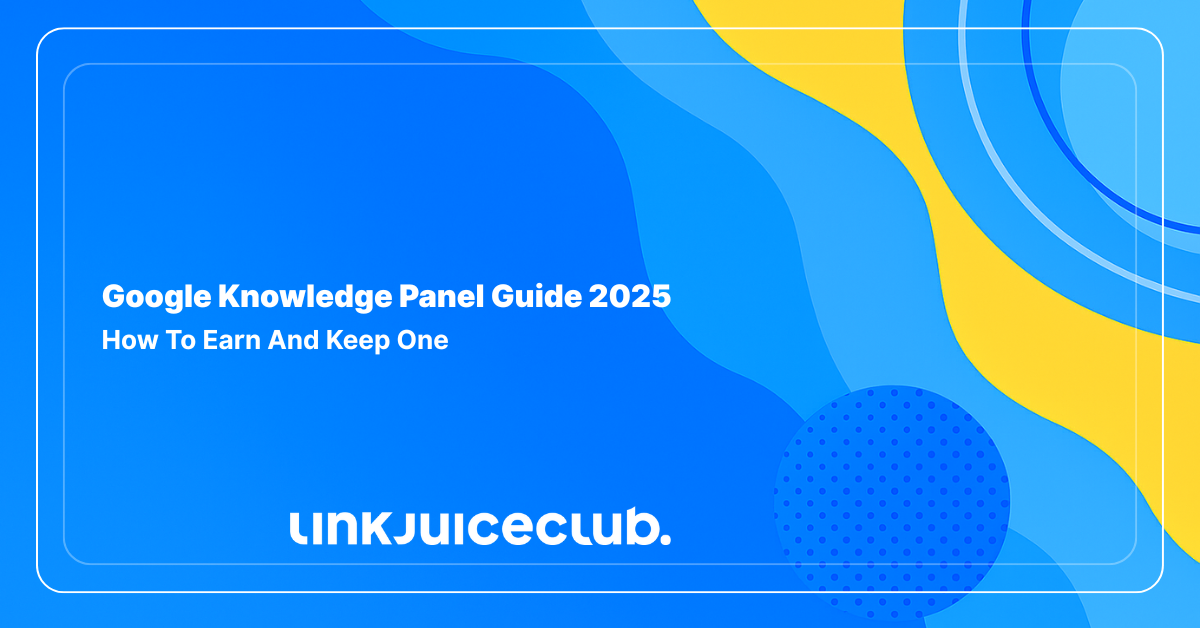
Google Knowledge Panel Guide 2025: How To Earn And Keep One
Seeing a Google Knowledge Panel next to search results is more than a digital perk — it’s a credibility signal. That information box tells users Google trusts your brand enough to summarize it directly on the results page.
For businesses and individuals, it’s like owning an official online badge of authority. The challenge, however, is earning one and keeping it accurate. This guide breaks down exactly what knowledge panels are, why they matter, and how to secure and maintain your place inside Google’s trusted space.

What A Google Knowledge Panel Really Is
When you search for a brand like Salesforce or a figure like Jeff Bezos, the right-hand side of Google displays structured information: company details, founder profiles, stock prices, social media links, or biographical highlights. This box is called a Google Knowledge Panel.
Its function is simple but powerful. It delivers an instant snapshot of verified information so users don’t have to click around. For businesses, it’s free visibility at the top of search results. For individuals, it’s a digital reputation builder that reinforces credibility.
Knowledge panels also act as an SEO advantage. They highlight key facts, strengthen your brand presence, and push competitors further down the results page. In a search landscape dominated by speed and trust, that visibility matters.
Why Knowledge Panels Matter More Than Ever
Appearing in a knowledge panel is about more than vanity. It signals authority. Customers see it as confirmation that you’re recognized by Google as credible and notable. That visibility translates directly into higher click-through rates and stronger brand recall.
Recent updates have deepened their impact. Google now pulls from a wider range of sources, no longer relying solely on Wikipedia. AI even helps generate some panel content, from descriptions to images.
Despite these shifts, Google’s E-E-A-T principles — Experience, Expertise, Authoritativeness, Trustworthiness — remain central. Brands with strong authority signals and consistent information are still the ones who win panels.
Simply put, the panel is both a trust stamp and a competitive advantage. If your rivals have one and you don’t, you’re already behind.
Step-By-Step Path To Securing A Knowledge Panel
Build A Recognizable Online Presence
Google can’t create a panel without consistent signals. Start by developing a clear, active presence across digital platforms. Your website is the foundation — keep it updated, optimized, and technically sound. Pair it with active social accounts on LinkedIn, X, Instagram, and Facebook.
For local or service-driven companies, a complete Google Business Profile is essential. Use the same branding — logos, bios, descriptions — everywhere. This uniformity allows Google’s knowledge graph to connect the dots and recognize your entity. Without it, your digital identity remains fragmented.
Consistency is your strongest ally. If you look the same across platforms, you’re more likely to be recognized as a trusted entity.
Publish Authority Content Across The Web
Authority isn’t built in isolation. Google values third-party mentions and external validation. That means extending your content strategy beyond your own site. Publish guest articles on reputable outlets, contribute to industry forums, and appear in interviews, podcasts, or webinars.
Each credible mention strengthens your reputation in Google’s eyes. It’s not about flooding the web with low-value content — it’s about being recognized in places that matter. Thought leadership, expert commentary, and collaborative projects all contribute to this wider web of trust.
The more respected sources that confirm your presence, the more compelling your case for a knowledge panel becomes.
Implement Schema Markup And Structured Data
Schema markup translates your brand into Google’s language. By embedding structured data on your site, you make it easier for search engines to understand who you are and what you represent.
For businesses, this could include founder names, headquarters, product lines, and services. For individuals, education, roles, and notable works are key. Schema also helps resolve identity issues when variations of your name exist, ensuring all signals unify into a single entity.
Think of schema as the roadmap that reduces guesswork. Without it, Google interprets. With it, you direct the narrative and reduce errors or duplicate panels.
Leverage Directories And Reviews
Directories provide third-party validation, a key factor in how Google measures trust. Listings on Crunchbase, Bloomberg, or sector-specific directories show that your presence extends beyond your own platforms.
Reviews amplify this credibility. Positive feedback on Google and industry-specific review sites confirms real-world trust. For individuals, testimonials or mentions in professional outlets serve the same purpose.
Pair this with strong visuals like consistent logos and headshots. Recognizable imagery helps Google connect your brand identity across platforms and reinforces authenticity in search results.
Claim And Verify Your Panel
If a panel appears for you, don’t leave it unclaimed. Verification gives you partial control, allowing you to correct errors and add context.
To claim, search for your name or brand, click “Claim this knowledge panel,” and authenticate through associated accounts like Search Console, YouTube, Facebook, or X. Once verified, you can assign roles to team members, from owners to contributors.
A claimed panel is treated as more reliable, which increases the likelihood that Google reflects your updates quickly. It’s the difference between being observed and being recognized as the official source.
Keeping Your Knowledge Panel Accurate
Securing a panel is a milestone, but maintaining it is an ongoing process. Google updates panels frequently, and inconsistency across platforms can cause yours to disappear or duplicate.

Consistency is key. Keep your website, business profiles, and directory listings aligned. If your business hours, leadership team, or branding changes, update everywhere at once. This uniformity reduces confusion and strengthens recognition.
Monitoring is equally important. Tools like Google Search Console and Semrush Position Tracking help you track whether your panel is active, especially after algorithm updates. Treat your panel as a living asset — refresh it with new content, achievements, and visuals to keep it relevant.
Brands that treat their panel as static risk fading from visibility. Those that nurture it remain credible in the long term.
Tools That Help You Win Panels
Several tools can streamline the process of securing and maintaining panels. Google Search Console remains essential for monitoring site health and correcting errors. Structured Data Markup Helper and Schema Validator simplify the technical side of schema implementation.
On the paid side, Semrush is highly effective. Its Position Tracking tool monitors panel visibility, while its Listings Management and Review Management tools strengthen authority through directory consistency and customer feedback. Combined, these resources reduce guesswork and give you control over your panel’s long-term presence.
When To Seek Expert Assistance
For smaller brands or individuals, the road to a panel can be steep. Missteps with schema, inconsistent mentions, or duplicate identities can delay progress. That’s when professional help becomes valuable.
SEO agencies and branding firms can streamline the process, from correcting technical errors to creating authoritative content strategies. If your efforts stall, expert guidance can save time and secure results.
What To Do If You Don’t Get A Panel
Not everyone qualifies for a panel immediately. Google prioritizes notable entities, which can make it difficult for new businesses or lesser-known individuals. But that doesn’t mean you’re out of options.
Focus on building authority step by step. Invest in your website, publish on platforms like Medium or LinkedIn, and pursue interviews or guest contributions. Use consistent branding everywhere — same name, job title, and organization.
Wikipedia has long been the obvious route, but alternatives like Crunchbase, Golden, and Wikitia also build authority. According to Kalicube, there are more than 200,000 trusted sources Google uses for panels, from financial reports to corporate databases. Explore these to strengthen your digital footprint.
Achieving Credibility Through Knowledge Panels
A Google Knowledge Panel is more than just a search feature. It’s a signal of credibility that tells customers Google recognizes you as trustworthy. Earning one requires building authority, publishing credible content, using structured data, and maintaining consistent branding.
Once secured, maintaining accuracy and visibility becomes the key. Monitor your presence, update regularly, and treat the panel as an evolving digital asset. Done right, it can be the competitive edge that keeps your brand visible, authoritative, and trusted.





